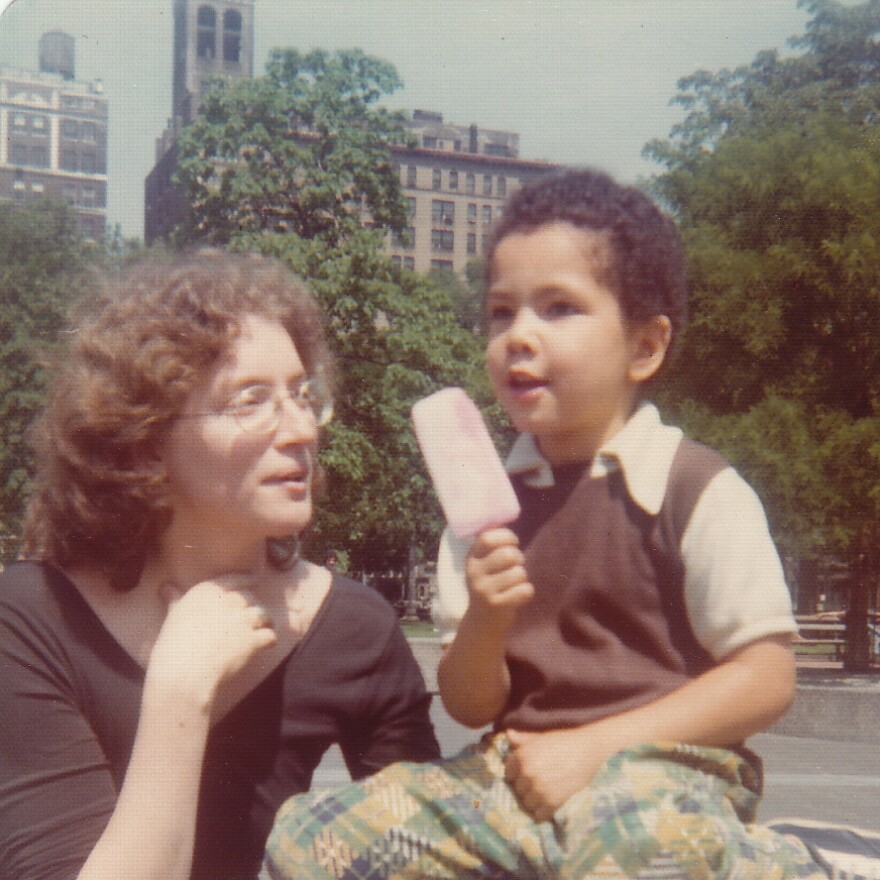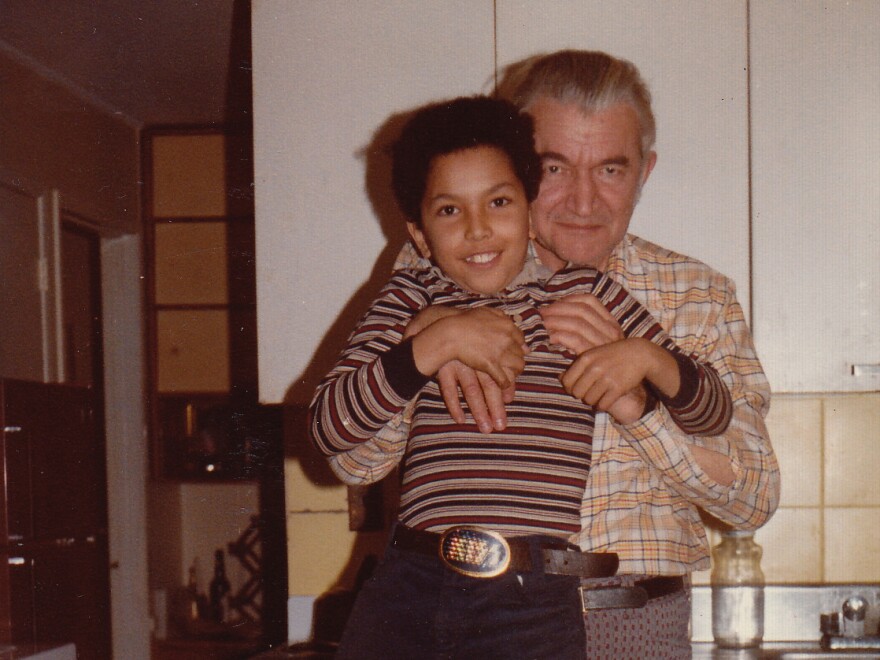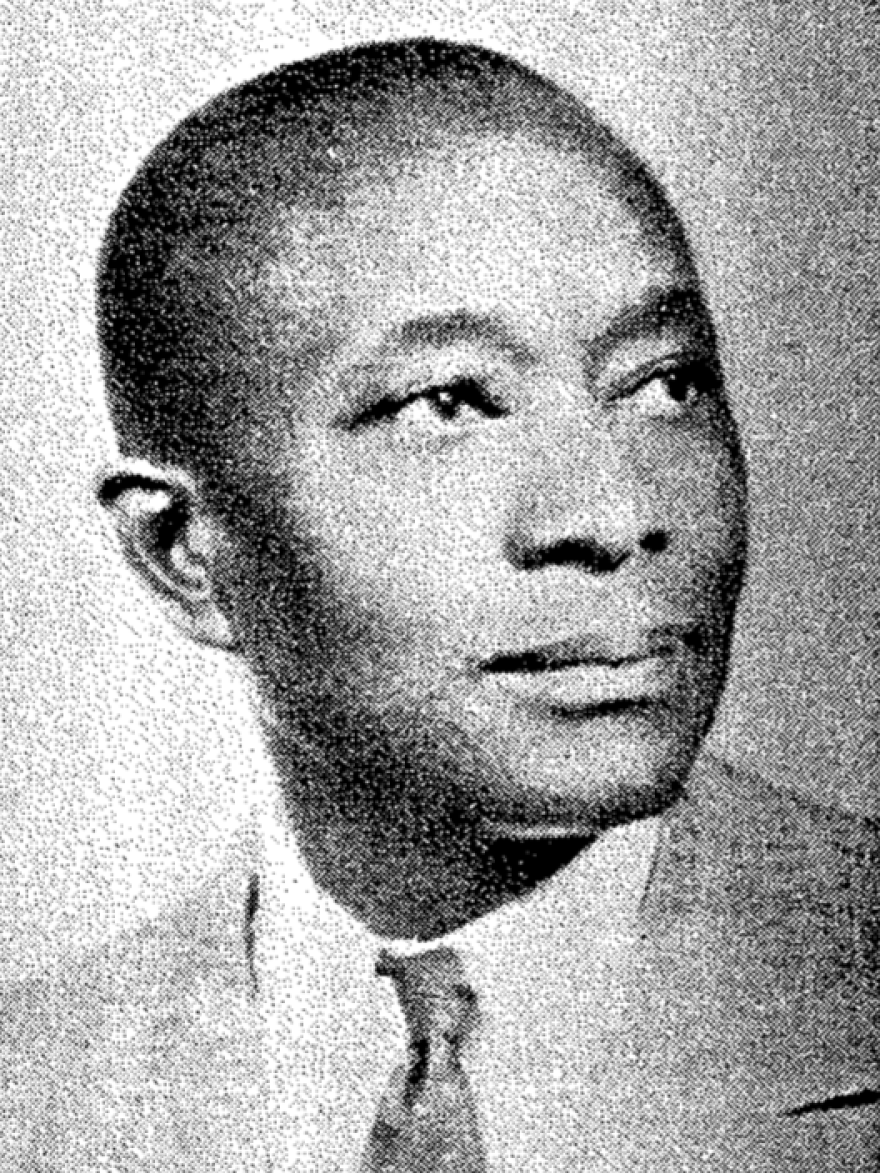"Well hello there Nabil!
"I welcome your letter.
...
"So in the little bit of information you shared with me, I am intrigued.
"I have worked for a number of years, 26 in fact, on my genealogy. It has been a passion and at times an obsession."
In her initial email to me, Karen surprised me with her excitement and candor — neither of which I was expecting from the woman whom I had gently accused of being the descendant of the man who owned my ancestors.
"Some of my Ayers ancestors were slave owners. I am aware of this, but know that at least some were included as family and are buried with my ancestors. I hope that was the case always."
After two email exchanges with Karen, I had created a mental image of her. She was older, but not old, possibly in her 60s, with short, cropped, graying brown hair. I imagined her seated at a kitchen table as she typed, in a modest, cozy home somewhere in the South:
"Yes I'm certain we are not blood-related, but it's evident of Ayers connection one way or another.
...
"I just looked you up on Facebook and found you! You have olive-like complexion and look part white. I don't mean anything negative. Just my observation. Some slaves assumed or took their owners name (don't like this) but for the sake of my attempt to explain... So let's say this Dr. Ayers perhaps was white and he had a child with one of the slaves?"
I've never been a father, and I've never had a father. Though my dad and I live in the same city, our paths have never crossed. Occasionally, someone asks me how he's doing. It surprises me every time, and I usually respond with something like, "You'd probably know better than I would," which feels confrontational and often leads to a slightly apologetic, less biting explanation of the fact that I've never known him.
I hope I inherited his best qualities and missed out on his worst, but I can only guess what those qualities are. For much of my life, even my racial identity has been somewhat of a question.

My mother, who is white, chose to have me and raise me on her own. My father is black, but because he has never been part of my life, I've never held a strong black identity or felt I belonged to any single race. I grew up in very diverse and liberal surroundings where, if anyone asked, I was racially mixed, and that was fine.
I'm often asked the question, "What are you?" Or the less invasive, but still pointed, "Where are you from?" I've always described myself as "half black and half white." It's a phrase I still use for simplicity.
But last winter, on a clear chilly day, I got tired of having to guess everything. So, like many people I know, I sent $99 and a tiny tube of my saliva to the genetic testing company 23andMe. I didn't expect any major surprises. My mother is fairly certain of her background — Eastern European Jewish. But I was hoping to learn something — anything — about the side of my family I had never known.
A month later, I got an email full of pie charts and graphics neatly breaking down my identity. According to 23andMe, I'm 66.2 percent European, which includes 51 percent Ashkenazi Jewish, and 32.6 percent sub-Saharan African. These numbers didn't change who I had always been, but they suggested that my father's ancestry might be less straightforward than I thought. After seeing them, I felt less black than ever.
I'd opted in to 23andMe's communication system, which allows newly found DNA relatives to establish contact within the site. Before I'd had a chance to explore it, a distant cousin on my father's side contacted me. We exchanged contact information, and a couple of weeks later, I awoke to an email from him with an attachment titled Ayers Family Tree.
Instead of going into work that morning, I made a pot of coffee and stayed on the couch, scrolling through the document's 20-plus pages of photographs and dense text. I saw dozens of names — Winnie, Luvenia, Moses — but none that I recognized.
Then I saw Ruby, my father's mother's name. Below Ruby, my father and his three sisters. Below my father, his oldest son — his only child when the family tree was written in 1963.
I had spent my entire life knowing nearly nothing about my father's family. Now, I had four generations of our history in a single email.

I feel lucky to have known my mother's parents and grandfather. As a child, I discovered that my mother laughs with her whole body, just like her grandfather, and that, like her mother, she waves her hand as if to physically push away uncomfortable conversation. As I get older, I can see pieces of my mother's family in myself.
But with this family tree, for the first time, I felt connected to my paternal ancestors. I read their stories and studied their photographs, searching for features in common with my own.
Isaac Ayers, my great-great-great-grandfather, was born into slavery around 1825. His son, James William Ayers, was born in 1850 and worked on a plantation for the first 20 years of his life. Though technically free after the Emancipation Proclamation was signed in 1863, his family had no money and nowhere to go. So, like many freed slaves, they continued to work on the plantation for another seven years.
My great-great aunt, Jenny Elizabeth Ayers, had ankle scars from being chased by the bloodhounds used to catch runaway slaves. She had 15 children. My aunt, Thomasina Ayers Pleasant, a strong-looking woman with a sharp smile and a striking head of reddish-black hair, earned her undergraduate and graduate degrees from USC and passed away just 2 years ago.
Only three generations exist between James William Ayers and me. My father's father's father's father was, 155 years ago, owned by another human being. Learning this history meant that, for the first time in my life, I felt directly connected to black ancestors who had names, faces and stories.
Suddenly, I felt less white than ever.
But I still wondered about my "66 percent European" DNA. There's no way all of that could have come from my mom's side of the family. So when I read the name of the man who had enslaved my family, Dr. Ayers (no first name given), I assumed he and I were connected — maybe even related. (After all, there's a long history of slave owners assaulting and impregnating their slaves. It's one of the reasons many black folks in the United States have significant European ancestry.)

The Ayers Family Tree claims that he owned a plantation in Ashland, Benton County, Miss., which had a population of only 174 people in 1880, the first census on record. According to the 1891 book, Biographical and Historical Memoirs of Mississippi Vol. 1, Dr. Augustus Machen Ayres was born in 1821 and buried in Ashland Cemetery in 1890. There was no guarantee that this was the man I was looking for, but he was a doctor, with the correct last name, the right age, in a town of fewer than 200 people. Augustus felt like a match.
As I dug into Augustus' story, I came across a woman who shared our last name and appeared to be a living descendant of his. Karen Ayers Weir. I felt an urgent need to contact her, but not for revenge or reparations. I craved knowledge — a deeper explanation of who I am and how I got here.
After several minutes of overthinking, I rattled off an email to Karen:
"I hold no ill will and I am not after anything at all. That was a different time and our family has since prospered. I am a happy, successful homeowner in Brooklyn, NY with a great job. I am simply fascinated by this process and I want to learn more about the people related to my family — even if they were our owners."
I woke up the next morning to her response. Karen, it turned out, lived in Texas with her husband of 44 years. They had several grandchildren. She loved the outdoors and sent me photos she'd taken of birds and ships on a recent coastal trip. Piles of genealogical documents existed in her home, some of which she said might be of interest to me.
Over days and weeks, our correspondence continued, and we quickly established a rapport. Here's one from Karen:
"Hello yourself. Yesterday was a very busy day. We ran about town all day and were completely worn out. We made healthy homemade pizza. My half always has black olives, red onion, feta and mushrooms- my husband's side is less veggies and more meat. Thin crust. We watched a movie and that was the entire day.
"The rest of the week is going to be crazy. I did take time to find the general area of what are sure to be my packed boxes of genealogy ..."
I began to feel as if Karen and I were living in parallel universes. Whether or not we shared a bloodline, our ancestors had lived together in a tiny town, leading very different, but very connected lives. And in the strange way of the world, Karen felt like someone who could fill in some gaps in my history that had been left open in my father's absence. She had more of my father's history in taped-up boxes than I had gotten in my entire life.
And still, I felt like our different circumstances might be too much to bridge. She was the descendant of slave of owners, and I, the descendant of slaves. A small bitterness inside me wanted Karen to make a wrong move — to expose herself as a racist or a Confederate. To allow me to feel some anger or resentment for what her family had done to mine.
So, after a couple of weeks, I sent Karen some essays I had published about my racial identity and discovering the strange and powerful Ku Klux Klan history in Dallas. I was testing the waters. We were fine discussing pizza and ancient family history, but what if I introduced the subject of racial injustice within our lifetime?
This woman was unflappable.
"Wow the article about the state fair and the klan was astounding-
"Amazing. I shared it with one of our sons who thought the same. Thanks."
And so, our unorthodox friendship continued.
My father will never be a part of my life — I've known that since I was a child. I've had only a handful of conversations with him, but now I talk to the woman whose family owned mine several times a week. It's one of the bizarre accidents of the modern age that it's easier for me to communicate with a distant connection in Texas than with the person with whom I share half of my DNA — a person who lives in the same city as me.
When people ask, I still say I'm half black and half white for simplicity, though all this new information means that I will never think of my identity so simply again. I'll always wonder about the relatives I never knew, whose stories I never heard. And I'll always wonder what exactlyit meant for my ancestors to be enslaved by the Ayers family — just how interwoven our identities might be.
There are clouds in my family's history, some obvious and others unknown. But the author of my family tree, Samuel Ayers, wrote closing words that offer a glimpse into the optimism that runs through my paternal family. Despite stories of enslavement, deceased infants and poverty, my family tree focuses on the progress my ancestors made over a century-and-a-half: "Now as the evening shadows gather around us, may there be only enough clouds to make a beautiful, emblazoned sunset."
Nabil Ayers is a Brooklyn based writer and U.S. head of the record label 4AD. You can find him on Twitter @nabilayers .
Copyright 2020 NPR. To see more, visit https://www.npr.org. 9(MDAwMTM1NDgzMDEyMzg2MDcwMzJjODJiYQ004))


